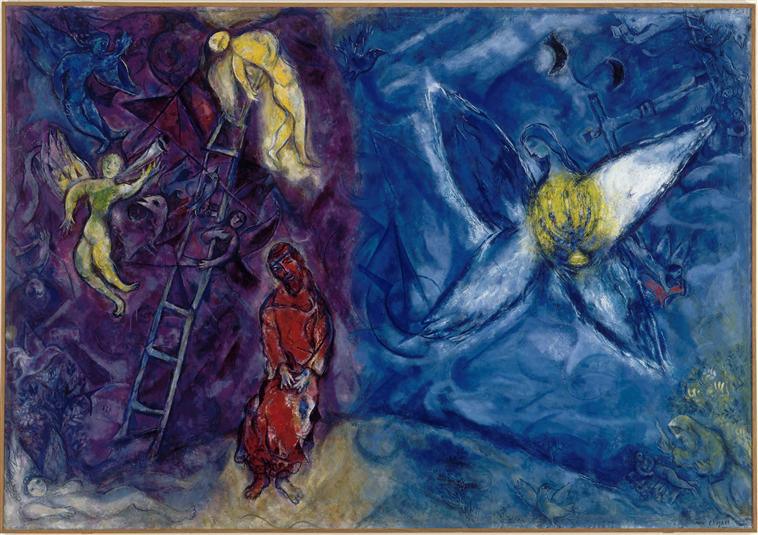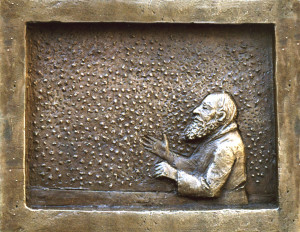Here is the complete series: 1, 2, 3a, 3b, 4, 5, 6.
Taking our cue from the angelic announcement that Jesus is “Emmanuel”, God with us, we have been asking about the “Presence of God” from Genesis to Revelation, and how this help us understand the story of God and our mission within it.
Last time we talked about how humanity failed to remain in the presence of God (Gen. 3) and failed to regain the presence of God (Gen. 11, Tower of Babel). Heaven and Earth no longer overlap because God’s un-mediate presence is lost (Heaven is removed from Earth).
But is all lost, and has humanity fully abandoned its call (election even) to be the “image of God” as re-presentative (royal-image) and re-presentation (cultic-image)?
The Blessing Continues: Abraham, Isaac, and Jacob
In Gen. 1:28 (a key text that we must always keep close to us) we hear that God blessed humanity and calls humanity to be fruitful and multiply. Well, all is not lost in the Fall because these three ideas, if not these exact words, are used to describe the calling and promise of Abraham, Isaac, and Jacob (the best translation to see this is the NASB).
Abraham: God called Abraham and blessed him to be a blessing (Gen. 12:1-3). And when God reaffirms his covenant with Abraham God say that he will make Abraham “exceedingly fruitful” and will “multiply him exceedingly” (Gen. 17).
Isaac: God promises to Isaac: “I will be with you, and will bless you…I will multiply your descendants as the stars of heaven” (Gen. 26:1-5) and again God says, “I will bless you, and multiply yourdescendants” (Gen. 26: 24). Notice that God is promising to be with Isaac, not just to bless him from afar.
Jacob: God says to Jacob: “ I am [l]God Almighty; Be fruitful and multiply” (Gen. 35: 11) (We’ll get back to Jacob’s so-called ladder in a second).
In each case, the promised blessing that was meant to rest on all humanity, but that was abandoned, is now promised to Abraham, Isaac, and Jacob as the ones through whom blessing would come again, and through whom the promise of being fruitful and multiplying would come again.
The Altars are Built: Abraham, Isaac, and Jacob
In each instance where these promises are made the author of Genesis is clear to point out that God 1) appeared to them and that each responded by 3) building an altar.
The particular places where a person had encountered the presence of God became a place of worship. Or we could say, it because a precursor to the later tabernacle and temple of Israel where God would dwell among His people.
And why would I say a “precursor”? Because this is exactly what we see in Jacob’s vision of a Ladder/Stairway coming down from heave.

Jacob’s Stairway to Heaven (cue the music)
After Jacob receives (or steals) his blessing from Isaac, a blessing in which Isaac says, “May God Almighty bless you and make you fruitful and multiply you, that you may become a company of peoples” (Gen. 28:3), Jacob then flees from his brother. Notice the connection again of blessing, fruitful, and multiply (this is again the Edenic blessing of Gen. 1:28).
When he lies down to sleep, he has a dream in which “a ladder was set on the earth with its top reaching to heaven; and behold, the angels of God were ascending and descending on it” (Gen. 28:12). The Lord also speaks to him there and promises that He will be “with him” always, going wherever Jacob goes (28:15). When Jacob wakes up he declares four things: 1) God was in this place; 2) It was awesome; 3) It was the house of God; and 4) It was a Gate of Heaven.
This place of God was the house of God, and the house of God (as we know) is always a reference to the Temple where God dwells, which (as we also know) is connected to Heaven, which means this place was the very Gate to Heaven, or in other words, it is a Stairway to Heaven. Jacob names this place Bethel, which means the house of God (Gen. 28:19).
And of course, Jacob builds an altar there to mark it as a place where God’s presence had appeared (Gen. 28:18).
All of this adds up to the fact that these altars, and especially the one in Bethel, functioned as little gateways to Heaven, which is the place of God’s presence, the place humanity had in the Garden of Eden but had now lost. These altars that began to mark the promised land as places of God’s presence were precursors of the Tabernacle and Temple which were the house of God particularly, even if creation was God’s house generally.
To Sum Up
So, God’s presence is coming to particular people in particular places in order to reengage the general blessing to all humanity of being fruitful and multiplying and able to experience the presence of God. God hasn’t abandoned humanity to be with His presence, but is making a way to be present to His people.
And all of these are precursors of God’s presence as it will be in the temple and the tabernacle.
But to talk about the tabernacle and temple leads us in the book of Exodus and beyond. This is it for this series.



4 replies on “Being the Temple for the World, #6”
[…] Here is the complete series: 1, 2, 3a, 3b, 4, 5, 6. […]
[…] Here is the complete series: 1, 2, 3a, 3b, 4, 5, 6. […]
[…] Here is the complete series: 1, 2, 3a, 3b, 4, 5, 6. […]
Should “un-mediate presence” be un-mediated presence? “God hasn’t abandoned humanity to be with His presence, but is making a way to be present to His people.” seems unclear. I guess you mean something like God hasn’t abandoned humanity, even though humanity abandoned him, but is making a way to be present to His people.